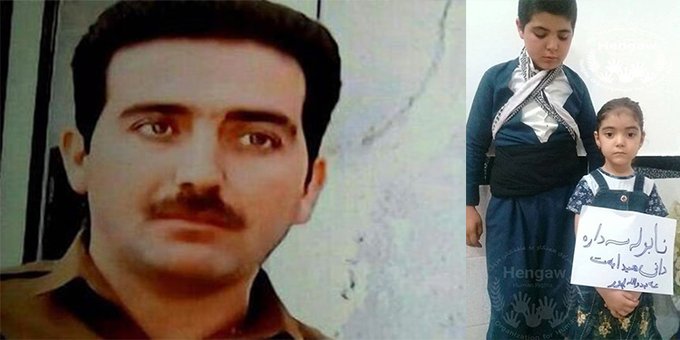Iran’s Regime Executed a Political Prisoner in Secret Three Weeks Ago

Written by
Shamsi Saadati
Iran: Kurdish Political Prisoner, Hedayat Abdollahpour was Executed by Iranian Regime
The Iranian regime secretly executed Kurdish political prisoner Hedayat Abdollahpour 21 days ago without informing his family.
The regime also refused to hand over the deceased body to his family for burial, instead, they buried him in a secret location.
According to the leading Rights group Iran Human Rights Monitor (IRAN HRM), Abdollahpour’s father was told yesterday, upon his arrival at the Implementation Unit of the Urmia Judiciary, that his son was executed on May 21, after he was moved to an undisclosed location on May 9.
IRAN HRM
@IranHrm
Kurdish political prisoner Hedayat Abdollahpour was executed in northwest #Iran
Neither his family nor his lawyer were informed about the execution and were not given the customary “last visit” with their loved one. #HumanRightshttps://iran-hrm.com/index.php/2020/06/10/iran-secretly-hangs-kurdish-political-prisoner-hedayat-abdollahpour-in-urmia-prison/ …
View image on Twitter
15
12:10 – 10 Jun 2020
Twitter Ads information and privacy
20 people are talking about this
His family has desperately tried to obtain information about his fate from the central prison in Urmia, the Centre for the Implementation of Sentences in Urmia, prosecution offices in Urmia and Oshnavieh, and the offices of the ministry of intelligence and the intelligence unit of the Revolutionary Guards in Urmia, but their inquiries were blocked at every turn.
On May 12, Abdollahpour’s wife followed up with the regime’s deputy prosecutor in Urmia who said that when no one tells you where your husband is, “you [had] better refer to the cemetery”.
Abdollahpour had been on death row in the central prison in Urmia since February 2017, following his unfair trial on the charges on “enmity against God” at the 2nd Branch of the Urmia Revolutionary Court.
He was arrested on June 15, 2016, alongside dozens of others, following a clash in his village in Qarah Soqol in Oshnavieh between the Democratic Party of Iranian Kurdistan and the IRGC. Those arrested were suspected of supporting the Kurdish group.
Abdollahpour, who had two children, was detained and tortured in the Urmia IRGC detention center for three months.
The regime’s cruel act of executing and burying Abdollahpour in secret is not uncommon in the case of political prisoners and ethnic minority groups. Sometimes their fate is hidden for years.
Amnesty International had previously wrote that three other prisoners from ethnic minority groups – Hossein Silawi, Ali Khasraji, and Naser Khafajian – have been forcibly disappeared recently and are at risk of secret executions.
The Iranian regime has a history of secret executions. In the summer of 1988, over 30,000 political prisoners, mostly supporters of the People’s Mojahedin Organization of Iran (PMOI / MEK), were executed in a matter of months. The regime has never published any information about this massacre.
The Iranian regime is the top executioner in the world per capita.
The international community should condition any relation with the mullahs’ regime to the immediate stop of executions. Thousands of other political prisoners in the regime’s dungeons are facing the danger of execution and are subjected to various forms of torture. In order to stop mullahs further human rights violations the international community, particularly the United Nations, should intervene and send a fact-finding mission to the Iranian prisons and force the regime to stop executions and torture.

